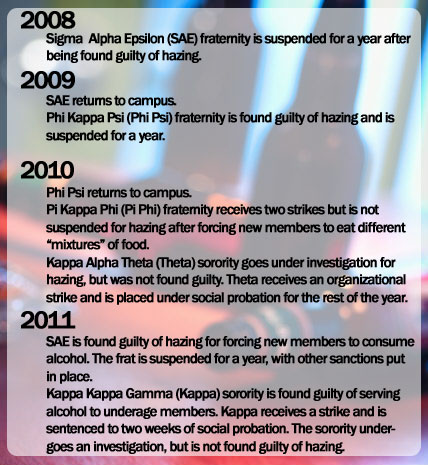SAE suspended for forced alcohol consumption
Feb. 21, 2011
Fraternity members of Washington and Lee’s Sigma Alpha Epsilon chapter moved out of their house and will not be allowed back in until at least the end of the current academic year. The University Board of Appeals found the fraternity guilty of hazing after an investigation on charges of “forced alcohol consumption.” And after a similar charge in 2008 removed the frat from campus for a year,  the brothers of SAE find themselves in familiar territory. W&L Director of Student Activities and Greek Life Clay Coleman said this ruling sets a new precedent for hazing cases. “SAE forced consumption of alcohol,” he said. “Now, if an organization has alcohol as a part of new member education, it will mean suspension.”
the brothers of SAE find themselves in familiar territory. W&L Director of Student Activities and Greek Life Clay Coleman said this ruling sets a new precedent for hazing cases. “SAE forced consumption of alcohol,” he said. “Now, if an organization has alcohol as a part of new member education, it will mean suspension.”
The Interfraternity Council had initially investigated SAE, but the UBA became involved after a community member indicated to the UBA that the IFC's sanctions were “not appropriate” in punishing SAE.
The IFC’s original sanctions included a dry fraternity house for a calendar year, dry informal rush events and a $200 per active member fine. These sanctions are to be fulfilled after those set in place by the UBA are completed. The frat also received two strikes from the university and was placed on critical probation for a year.
Investigating and addressing hazing at W&L
The severity of punishments for hazing can become quite harsh, reflecting the nature of the incident and the reports. In hearings and meetings conducted by the IFC and Panhellenic Council, members of the Greek community hand down decisions and sanctions regarding the treatment and severity of the incidents in question for Greek organizations. The IFC deals with fraternities, and Panhel deals with sororities.
However, if a member of the community disagrees with the actions taken against the organization in question, that person can appeal to the UBA, providing the actions would “create a disciplinary record.”
Hazing, according to the W&L student handbook, “includes harassing and excessive tasks associated with initiation or membership in an organization. It involves mistreatment of prospective members by those who exercise control over them.”
Examples of hazing include, among others:
- Physical abuse such as paddling, striking, branding, electric shock or bodily contact with harmful substances
- Intimidation by threats of physical or other abuse
- Excessive exercise or other tasks intended to cause physical exhaustion
- Prolonged or repetitive tasks that result in sleep deprivation
- Prolonged or harmful exposure to the elements
- Compelled consumption of any amount of alcohol
- Compelled consumption of food, liquids or concoctions intended to cause nausea
- Any task that requires the participant to violate the law or University policies
According to Virginia law, any person convicted of hazing “shall be guilty of a Class 1 misdemeanor” regardless of whether the person or persons being hazed “participated voluntarily in the relevant activity.”
Teri Cugliari, Assoiciate Director of Student Activities and Greek Life, echoed the state law, saying, "not feeling like you were hazed and being okay with hazing is different."
Cugliari and the Director of Student Activities and Greek Life, Clay Coleman, alluded to certain “green light” and “red light” activities when it comes to hazing. “Green light” activities foster leadership and growth within the Greek organizations, and “red light” activities usually constitute hazing.
According to Coleman and Cugliari, the lines get kind of fuzzy when dealing with hazing, so keeping an eye out for certain behaviors can prevent accidents. Most instances of hazing, according the Cugliari, are reported anonymously to her office.
   |
 |
“Not all reports come from students,” Cugliari said. “In fact, some are reported from athletics, coaches, faculty members who have seen scratches and bruises. Most reports come from a place of concern.”
After a report has been made, Public Safety then conducts an investigation to follow up on the accusation. If charged with hazing, the issue will then go to the IFC or Panhel, depending on which organization it is, who will determine whether or not hazing occurred and how to punish it.
Not all hazing sanctions require that an organization be suspended, however. Last year, Pi Kappa Phi fraternity was found guilty of hazing by forcing new members to eat “different food concoctions.” According to Coleman, the IFC declared that the actions were hazing. Even though the university has a zero-tolerance policy on hazing, it does not state that an organization has to be suspended if found guilty – only that suspension or expulsion be considered. Instead, Pi Phi received two strikes, and its members had to take an alcohol education and risk management program with their nationals and complete community service hours.
New Member Education, sometimes informally referred to as pledgeship, is “a period of time for students who have just joined a Greek organization to learn the values of that organization, to reflect on how those values mesh with their own, to increase their friendship and respect for each other and for their new fraternity brothers, and to improve their ability to guide their daily actions with appropriate decision making.” This New Member Education period is when most hazing occurs.
But, hazing does not only occur in fraternities. Sororities, too, have been known to haze. Recently, Kappa Kappa Gamma sorority was placed on two weeks of social probation, following strikes received from supplying underage members with alcohol. Charges were brought against the sorority accusing the women of hazing new members; however, Panhel did not find the women guilty.
Kappa’s decision comes nearly a year after another sorority, Kappa Alpha Theta, was placed on social probation for a year following a similar incident. Even though Theta was not found responsible for hazing, the women were not allowed to host theme-parties with fraternities nor sorority formals.
Cugliari said, though, it is “unfair” to compare the two incidents, and that Panhel judges each charge on a case-by-case basis, so it makes it “hard to predict what will happen to your organization. It’s all based on the situation at hand.”
And, hazing is predominant throughout the nation not just in Greek organizations. In fact, national statistics show that most hazing occurs on athletic teams, followed by marching band and then Greek organizations. But, on a campus with a student population that is nearly three-fourths Greek, it is easy to overlook the national averages – and the occurrence of hazing.
Both Coleman and Cugliari attribute the “hush-hush” view of hazing to the culture surrounding Greek life on campus.
“It’s not super secret,” said Cugliari. “If people want to know what happened, they can drop by my office and ask me. I’ll tell them. I think it’s because everything surrounding hazing is super secret, so it makes it seem that when [a frat is caught] that [the incident] is much more egregious than it actually is.”
| Regional events calendar |
Local government websites: |
Produced by Washington and Lee digital journalism students.
![]()




